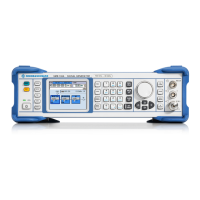R&S SMB Automatic Level Control - ALC
1407.0806.32 4.37 E-2
Automatic Level Control - ALC
Automatic level control (Automatic Level Control) can be used with almost all applications, except for
pulse modulation.
The level control status is permanently displayed as a status message in the info line.
The standard operating status is level control On. This provides the highest level accuracy. The preset
is Auto. In this mode the level control is automatically adapted to the operating conditions.
Level control can be switched to Sample&Hold or On for particular applications. The Sample&Hold
state (level control Off) is recommended e.g. for two-tone measurements with two R&S SMB Signal
Generators. .
If Sample&Hold is selected, the level is recalibrated for every level and frequency setting. For this
purpose, level control is activated briefly at a defined signal, the level adjuster is then held at the
attained value and level control is deactivated.
NOTE
The level is decreased by 30 dB during Sample&Hold measurement!
When pulse modulation is activated, the ALC state of the R&S SMB is automatically
changed to ALC OFF (Sample & Hold). In this state the ALC loop is opened and the
output level is not regulated but the level modulator is set directly. In order to set the
correct output level, a sample & hold measurement is executed after each frequency
or level setting. The level is decreased by 30 dB during Sample&Hold measurement
Automatic Level Control Menu
The Auto Level Control menu is opened in the RF Mod function block or using the MENU key under
RF.
The combined Auto Level Control… menu provides access to the automatic level control settings in
the upper section.
The lower sections provide access to function User Correction, see section "User Correction", page
4.39.

